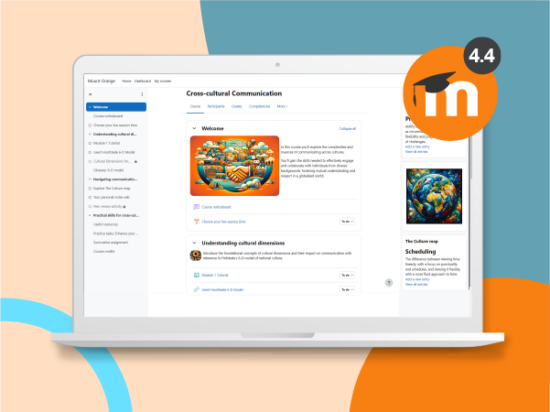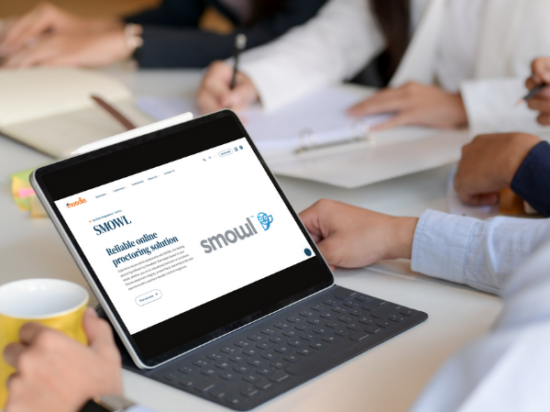The HR stack refers to the collection of software and tools used by HR professionals to streamline various processes, such as recruitment, onboarding, performance management, and employee engagement. It typically includes an array of applications like applicant tracking systems, HRIS (Human Resources Information System), payroll software, and other essential tools that collectively form the backbone of efficient HR management.
Managing various HR stacks can be a complex task due to the disjointed nature of HR tools. This leads to data silos where information is stored in isolated pockets or systems, making it challenging to have a unified view of employee data across different HR functions. Also, inconsistent training may arise due to this lack of integration, resulting in programs that lack coherence and fail to align with broader organisational goals.
To tackle these issues, integrating enterprise learning management systems (LMS) like Moodle Workplace with your HR stack can be a transformative solution. In this article, we’ll explore how Moodle Workplace bridges gaps within your HR stack, offering a unified platform for seamless operations and improved employee satisfaction.
Unified data management
Data silos and inconsistencies across HR systems pose challenges for HR professionals by complicating the management of employee records, certifications, and learning materials. The lack of synchronisation creates difficulty in ensuring the accuracy and uniformity of information.
Moodle Workplace provides a practical solution by centralising all training information in one place. It streamlines the management of employee data and certifications, ensuring consistency and enabling teams to share training materials easily. Real-time progress monitoring and task automation enhance operational efficiency, allowing administrators to respond promptly to emerging needs. With the release of Moodle Workplace 4.3, the platform further simplifies job-related information and reporting lines, providing team leads with a comprehensive view of their team’s structure and performance.
Efficient onboarding centralisation
Efficient onboarding is crucial for the smooth integration of new hires into a company, but the challenge arises when the process is scattered across various systems, leading to a time-consuming and disorganised experience. Moodle Workplace offers a streamlined solution to this challenge by centralising onboarding processes.
Furthermore, the platform can integrate with a human resources information system (HRIS) to support a variety of data flows. Through the expertise of Moodle’s service partners in leveraging Moodle’s APIs, this integration can improve efficiency, ensuring centralised access, data consistency, and the automation of processes. New hires, for example, can be automatically assigned all training curricula, policies, and essential resources in Moodle Workplace, simplifying the onboarding journey and contributing to a more efficient and user-friendly experience.
Enhanced employee engagement
The challenge in improving employee engagement within organisations often arises from a lack of effective methods to encourage continuous learning. Employees may not consistently feel motivated or involved in ongoing learning initiatives, leading to a potential lack of enthusiasm for skill development. Moodle Workplace directly addresses this challenge by integrating features that foster engagement.
Moodle Workplace incorporates interactive elements, such as gamification, providing additional tools and features tailored for workplace learning. Built on the feature-rich foundation of Moodle LMS and social constructivist pedagogy, Moodle Workplace seamlessly integrates into the corporate training environment, allowing organisations to motivate employees, track progress, and foster a collaborative learning culture.
Streamlined reporting and analytics
Human Resources (HR) departments deal with a vast amount of information related to employee performance, engagement, and recruitment. The problem arises when the data is scattered across various systems, making it challenging to generate comprehensive reports and derive meaningful insights. Insufficient integration among diverse HR tools, coupled with data format inconsistencies, poses a challenge for HR professionals in making well-informed decisions and formulating strategic plans with accurate and up-to-date information.
While Moodle Workplace may not directly address these integration issues, it serves as a valuable solution by offering learning analytics and generating reports based on organisational attributes like job title, department, or new-employee status. This functionality can significantly contribute to enhancing HR decision-making processes and strategic planning within the organisation.
Moodle Workplace makes it easy for administrators to create customised reports. They can choose what information to include, like user names, certifications, and completion status, by adjusting data fields. The flexibility ensures that reports are tailored to the specific needs of the HR team, making it simpler to gather and analyse the information that matters most for strategic decision-making and resource allocation. This enables HR professionals to gain deeper insights into workforce dynamics, identify trends, and address critical issues effectively, ultimately enhancing organisational performance and employee satisfaction.
Conclusion
Moodle Workplace centralises training information, streamlines employee data, and enhances operational efficiency. It incorporates interactive elements for employee engagement and simplifies reporting and analytics. As a user-friendly platform, it empowers HR professionals to optimise their HR processes and contribute to organisational success.



